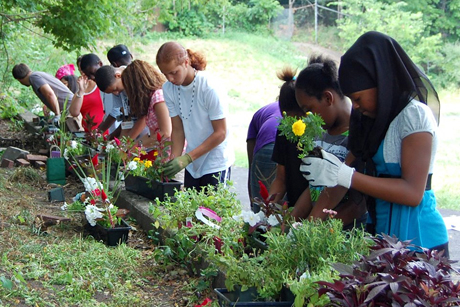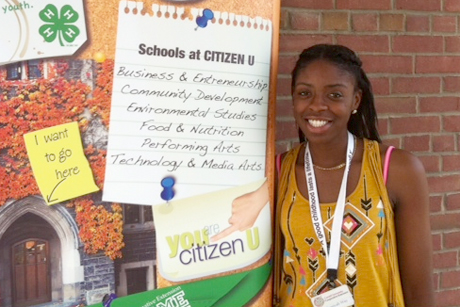Program puts at-risk youth on a path to college
By Sarah Cutler


Thanks in part to a Cornell youth development program, Shaniyah Way is attending Broome County Community College this fall.
After two years of study and service, Way was one of 24 teens in Broome and Monroe counties to graduate in August as the first class from CITIZEN U, a 4-H program run by Cornell Cooperative Extension (CCE) and the Bronfenbrenner Center for Translational Research in the College of Human Ecology to help at-risk youth become active in their communities and prepare for college careers.
Way credits CITIZEN U with giving her “extra motivation” to continue her studies after earning her high school diploma last spring. She and seven other CITIZEN U graduates are attending college this fall, while the rest are continuing as program leaders until they graduate high school.
“At first, I wasn’t sure if I would go to college or not – I’m good at school but didn’t feel like college was for me,” she said. “But with CITIZEN U, we took a lot of trips to college campuses and stayed overnight, which got me really wanting to go.”
Started in 2011 with a $660,000 grant from the Children, Youth and Families at Risk Program at the National Institute of Food and Agriculture, CITIZEN U mirrors a university setting through weekly after-school seminars taught by experts from CCE, community agencies and business partners.
“Many of the students don’t have anyone in their family who graduated from high school, much less college, so getting in to college was so alien to them,” said statewide program director June Mead. “After CITIZEN U, they’re more comfortable with going to college – selecting a major, having professors, all the things that go on.”
The program also emphasizes civic engagement. Broome County students filmed a PSA, #Respect, about preventing teen dating violence, which earned second place in the Veto Violence campaign by the Centers for Disease Control and Prevention, while Monroe County students held a fashion show to invite a discussion about adults’ perceptions of teens based on their clothing. The groups have also organized clothing and fundraising drives for needy families and converted a vacant lot into a community garden.
“I think the program has had a pretty significant impact on building a sense of identity and community,” said Valerie Adams-Bass, state program leader for 4-H, which operates CITIZEN U. “We are reaching at-risk, underserved youth – students who wouldn’t be involved in 4-H if not for CITIZEN U. That for me is really exciting.”
During the summer, students are employed and conduct community development projects related to their courses. Summer jobs have ranged from a group of students interested in criminal justice who worked for police officers or in forensic labs, to one student interested in marine biology who worked with penguins and sea otters at a Binghamton zoo.
“It was a match made in heaven,” Mead said. “She was over-the-moon happy, and she’s volunteering there during the school year now. She loved it, and they loved having her.”
Mead said the recent graduation ceremony revealed the “astonishing back stories” of many CITIZEN U participants, recalling one student who has supported herself since her mother left her to move to Florida.
“When she got up and spoke, there honestly wasn’t a dry eye in the room,” Mead said. “It is so amazing to see what can happen when young people have somebody who cares about them, and that’s why the two years in the program are so important. We develop very close relationships with all these young people, and they feel cared about.”
CITIZEN U is supported by Smith Lever funds, the National Institute of Food and Agriculture and the U.S. Department of Agriculture.
Sarah Cutler ’16 is a student communications assistant for the College of Human Ecology.
Media Contact
Get Cornell news delivered right to your inbox.
Subscribe